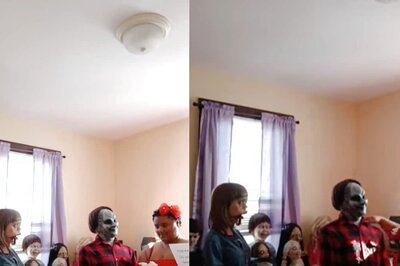
views
Learning Sign Language

Enroll in a college level training program. Many colleges and universities have accredited programs to teach you how to become an interpreter. Complete an undergraduate or associate’s degree by enrolling in an interpreter training program. Programs include: Learning about deaf culture. How to sign. How to get certified.

Take classes online. You can learn sign language easily and from the convenience of your own home online. Complete programs are typically available for a fee. Look through websites carefully, before you purchase coursework. Look for online classes that involve more than one way of teaching, like webcams, videos and forums.

Take individual classes. You don’t have to take an entire college program or online course to learn sign language. Go to your local adult education or technology center and find out if they offer sign classes. Start ASL offers free classes in addition to full courses online.

Go to deaf events. The best way to learn any language is by interacting with others and practicing. Larger cities should have an active deaf community and you can find them in smaller ones too. There are a number of ways to go to events and find deaf friends including: Contact the agency that oversees deaf services in your area and ask them about deaf programs. Find an interpreter and ask them about deaf events. Find online deaf communities to get a point in the right direction. Subscribe to a deaf community newsletter to find events. Most large cities have deaf newsletters.

Learn about deaf culture. An important part of learning sign language includes learning about deaf culture. Some norms in deaf culture are different than in hearing culture. Do not try to speak loud and slowly, because this can be insulting to a deaf person. Things that can be different include: Using facial expressions. Many deaf people use exaggerated expressions to get their points across in addition to signing. Introducing yourself by name and area. Because it can be hard to find other deaf people, introductions are always made with the area you grew up in. Staring is encouraged. Because eyes are used instead of ears, you should always look at the deaf person you are communicating with.
Passing Certification Exams

Find out what is required for certification. If you're in the U.S., contact your state's agency that oversees deaf services. In Texas, it's the Dept. of Assistive and Rehabilitative Services. The place you live will probably have something similar. Keep in mind other countries will have different requirements. In France, interpreters must complete a master's program. Write, email, or call and ask for information about becoming certified to interpret.

Get nationally certified. The Registry of Interpreters for the Deaf, Inc. (RID) oversees a National Interpreter Certification (NIC). A NIC certification can often be used in place of your local certification requirements, but check first. You must have a bachelor’s degree, take a written exam, be interviewed, and take a performance exam to get NIC certified.

Get certified to be a deaf interpreter by RID. RID also offers a Certified Deaf Interpreter (CDI) assessment. This can also sometimes be used in place of your local certification laws. To get a CDI you must hold at least an associate’s degree, pass a knowledge test, and hold 40 training hours.

Take the Educational Interpreter Performance Assessment (EIPA). If you want to work with children in an educational setting, you will probably have to take the EIPA. Be prepared to be evaluated on your ability to interpret classroom content to children and teens, who are deaf or hard of hearing. Testing includes: A written and knowledge exam. A Performance test. A second performance test on cued speech, which makes individual sounds visible to children learning to read.
Finding Employment

Check resources available at your training program. If you took a college interpreter course, you will likely have employment resources available to you. Talk to your instructors about where you might be a good fit. Make an appointment with a school counselor to get more ideas of where to look for employment. Schools often partner with area businesses, who need people trained in jobs they have available.

Look at openings in your government. Interpreters for the deaf often work in government through the public school or court system. Check your government job boards to see what openings they have available. Government work can be available on the local or national level.

Work with an employment agency. Working with an employment agency is much like freelancing, except the agency is contacted for your services first. Government agencies and businesses will look to the agency to refer the best interpreter for the job. Apply to an agency specifically set up to provide sign language interpretation services.

Work for yourself. Interpreters can freelance their services to places like hospitals or schools. Freelance assignments can be varied, because it depends on who and what is involved. Be ready to step into seminars to interpret about subjects you may not be familiar with.




















Comments
0 comment